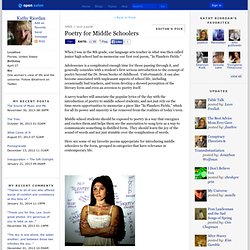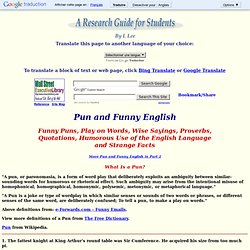

The News Literacy Project - About Us. Write rhymes. RhymeBrain - Rhyme any word, even made up ones. FREE Online Rhyming Dictionary - StumbleUpon. Poetry Out Loud. Poetry Out Loud finals: Youssef Biaz reads 'Those Winter Sundays' by Robert Hayden. US teenagers flock to live poetry events. Poetry for Middle Schoolers - Kathy Riordan. When I was in the 8th grade, our language arts teacher in what was then called junior high school had us memorize our first real poem, "In Flanders Fields.

" Adolescence is a complicated enough time for those passing through it, and generally coincides with a student's first serious introduction to the concept of poetry beyond the Dr. Seuss books of childhood. Unfortunately, it can also become associated with unpleasant aspects of school life, including occasionally bad teachers, and teens develop a skewed perception of the literary form and even an aversion to poetry itself. A savvy teacher will associate the popular lyrics of the day with the introduction of poetry to middle school students, and not just rely on the time-worn opportunities to memorize a piece like "In Flanders Fields," which for all its power and sincerity is far removed from the realities of today's teen. Self-esteem: "I'm nobody!
I'm Nobody - Emily Dickinson Provide, Provide - Robert Frost The Silken Tent - Robert Frost. Kenn Nesbitt's Poetry for Kids. Found Poem. Found poems take existing texts and refashion them, reorder them, and present them as poems.

The literary equivalent of a collage, found poetry is often made from newspaper articles, street signs, graffiti, speeches, letters, or even other poems. A pure found poem consists exclusively of outside texts: the words of the poem remain as they were found, with few additions or omissions. Decisions of form, such as where to break a line, are left to the poet. Examples of found poems can be seen in the work of Blaise Cendrars, David Antin, and Charles Reznikoff. In his book Testimony, Reznikoff created poetry from law reports, such as this excerpt: Amelia was just fourteen and out of the orphan asylum; at her first job--in the bindery, and yes sir, yes ma'am, oh, so anxious to please. Many poets have also chosen to incorporate snippets of found texts into larger poems, most significantly Ezra Pound.
Examples of Found Poems: Day [excerpt] by Kenneth Goldsmith Found Poem by Howard Nemerov. Types of Poetry. Haiku error messages. ... imagine a puddle. English 50. The Best Resources For Learning About “Word Clouds” “Word Clouds” are collections of words from a document or documents that show the frequency of word use by their size, and are often designed in a unique manner.

They’re great tools for reflection and other uses (for example, I’ve created Wordles of my two books here and here). Wordle is the most popular application for creating these kinds of word clouds. It was recently off-line for awhile, though it is back now. It’s temporary disappearance sparked a lot of discussion of word clouds and alternative applications. Because of that discussion, this list is a little different from my other “The Best…” lists. Here are my choices for The Best Resources For Learning About “Word Clouds”: You have to start with Tom Barrett’s Forty-Four Interesting Ways* to use Wordle in the Classroom. Check out Shelly Terrell’s 12 Word Cloud Resources, Tips, & Tools.
Marisa Constantinides has another great post with word cloud examples. Phil Bradley also has a nice post comparing word cloud apps. Analyze My Writing. Nature. Pun and Funny English: Funny Puns, Play on Words, Weird or Humorous Use of English Language, and Wise Sayings. Translate this page to another language of your choice: To translate a block of text or web page, click Bing Translate or Google Translate More Pun and Funny English in Part 2 What Is a Pun?

"A pun, or paronomasia, is a form of word play that deliberately exploits an ambiguity between similar-sounding words for humorous or rhetorical effect. Such ambiguity may arise from the intentional misuse of homophonical, homographical, homonymic, polysemic, metonymic, or metaphorical language. " "A Pun is a joke or type of wordplay in which similar senses or sounds of two words or phrases, or different senses of the same word, are deliberately confused; To tell a pun, to make a play on words. " Above definitions from: e-Forwards.com - Funny Emails.
View more definitions of a Pun from The Free Dictionary. Pun from Wikipedia. 1. 2. 3. 4. 5. 6. 7. 8. 9. 10. Story Starters. English Grammar Lessons. Idioms Discussions. Lexipedia - Where words have meaning.